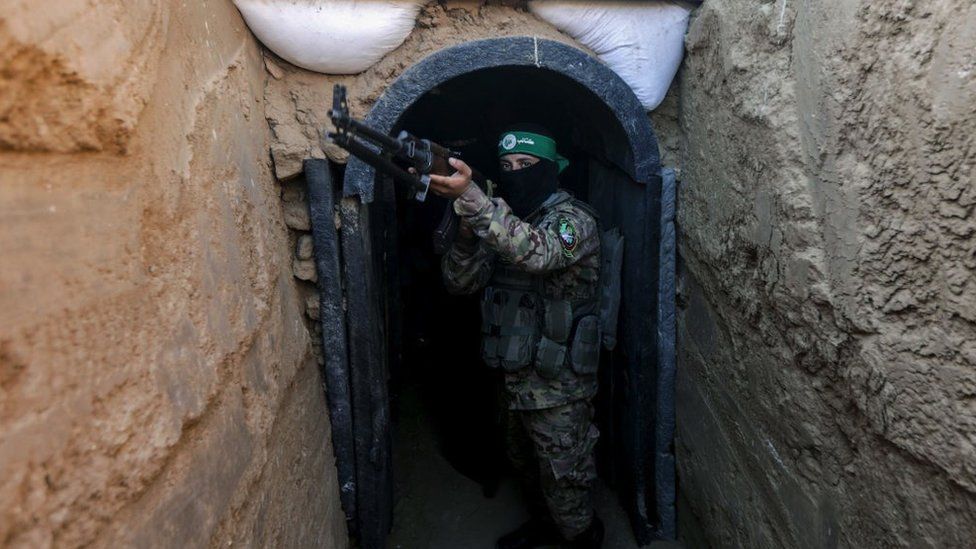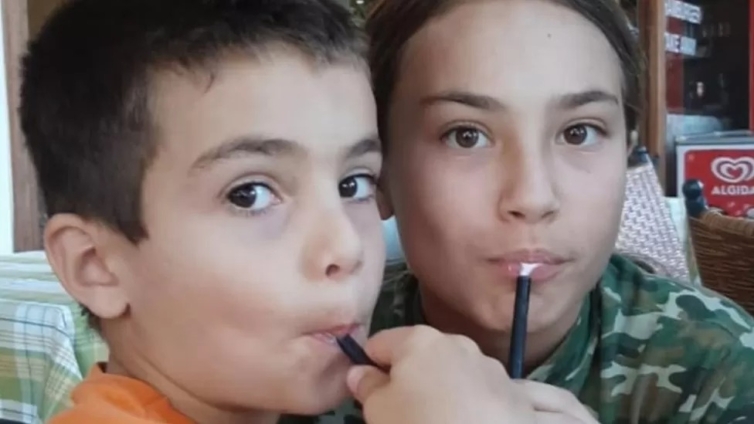As hundreds of thousands of Israeli troops, regular and reservist, gather on Gaza's borders, the Israeli government faces a near impossible situation.
At least 150 hostages seized by Hamas gunmen from southern Israel last Saturday are now being held at secret locations inside Gaza. Among them are women, children and the elderly.
If Israel decides to launch a full-scale ground invasion of Gaza, as some are expecting could be imminent, then what are the chances those hostages will survive?
No mood for compromise
Behind the scenes, Qatar, Egypt and possibly other countries are believed to be trying to negotiate a partial release of those hostages. One idea being mooted is for Hamas to release its women and child prisoners in exchange for 36 Palestinian women and adolescent prisoners being held in Israeli jails.
But Michael Milstein, Senior Analyst at the Institute for Policy and Strategy at Israel's Reichman University, told me that while in normal times the number one priority for Israel would be the return of those hostages, today it is the elimination of Hamas as a military threat.
With tensions and anger sky-high on both sides, neither Israel nor Hamas are in the mood for compromise or concessions. Israelis are shocked and outraged that gunmen were able to breach their southern border so easily and then murder at least 1,200 people, most in cold blood.
Palestinians, and not just Hamas, are reeling from the onslaught of more than 2,000 Israeli airstrikes on Gaza that have killed more than 1,000 people since Saturday. Gaza has been cut off from fuel, electricity, water and medicine.
Hamas has threatened to "execute" one hostage for each time an Israeli airstrike kills civilians without warning. There is no evidence they have done so yet. At the same time there is little sign of restraint from Israel. Large parts of Gaza are being intentionally reduced to rubble.
However Milstein believes that Hamas may not be keen to hold on to its women, children and the elderly. They are bad optics for the group internationally and many will require a high degree of care, not easy amid constant air strikes and when Hamas are trying to keep their location secret from any covert informants Israel may have inside Gaza.
By contrast, Hamas will want to take maximum advantage of any serving military personnel it holds, extracting the highest price for their release if negotiations take place.

No easy option
This leaves the Israeli government with a dilemma when it comes to the hostages. Does it attempt an armed rescue mission, something fraught with risks? Or does it wait for longer, until Hamas is so weakened by airstrikes, that it might be more willing to make a deal?
That option carries its own risks. Although the hostages are thought to be held below ground in tunnels and bunkers, they may not be immune to these airstrikes. There is always the risk that their captors could kill them, either in a fit of rage or if they feared they were on the point of being rescued. This happened in Nigeria in 2012 during a failed UK-Nigerian Special Forces mission to rescue two hostages held by jihadists.
Israel has been quick to set up a Hostage Situation Room, collating everything it knows on the identity and status of each of the hostages who were dragged at gunpoint across the border into Gaza on Saturday.
Those who were still being held on Israeli territory were rescued by Israeli military and police Special Forces, with all their Hamas captors killed. But Michael Milstein, who spent 20 years in Israeli military intelligence, warns that "we don't have all the data on every house and street in Gaza". This is where Hamas are on home ground, able to conceal both themselves and their hostages in a network of underground cellars and tunnels.
Israel has a well-proven expertise in hostage rescue, which it trains for intensively. Set up in 1957, its secretive Sayeret Matkal unit is broadly similar to Britain's SAS or America's Delta Force. It shot to fame in 1976 with its Raid on Entebbe where its commandos rescued hostages from a hijacked plane at a Ugandan airport.
The commander of that unit was Yonatan Netanyahu, the only fatality amongst the Israeli commandos. Today his brother Benjamin is Israel's Prime Minister and it is with him that the decision rests as to whether to wait it out in the hopes of a negotiated release of the hostages or go in hard in the hopes of rescuing them by force.
'The hardest hostage situation yet'
Reports are emerging that the US is providing assistance with intelligence data and possibly even support from its own Special Forces. A large US Navy carrier group is positioning itself offshore in the eastern Mediterranean.
But Hamas have shown themselves capable of asymmetric warfare, of being able to make up for Israel's massive advantage in technology and firepower.
By avoiding leaving a digital trail in their communications and keeping those communications to a minimum, they were able to take Israel by surprise on 7 October. Their gunmen who are currently holding those 150-plus hostages will be staying offline and off the airwaves as far as possible and will almost certainly have removed every digital device from their captives.
"This is without question," says Michael Milstein, "the most difficult hostage situation Israel has ever faced in its history".
Latest Stories
-
CLOGSAG vows to resist partisan appointments in Civil, Local Government Service
59 minutes -
Peasant Farmers Association welcomes Mahama’s move to rename Agric Ministry
1 hour -
NDC grateful to chiefs, people of Bono Region -Asiedu Nketia
1 hour -
Ban on smoking in public: FDA engages food service establishments on compliance
1 hour -
Mahama’s administration to consider opening Ghana’s Mission in Budapest
1 hour -
GEPA commits to building robust systems that empower MSMEs
1 hour -
Twifo Atti-Morkwa poultry farmers in distress due to high cost of feed
1 hour -
Central Region PURC assures residents of constant water, power supply during yuletide
1 hour -
Election victory not licence to misbehave – Police to youth
1 hour -
GPL 2024/2025: Nations thrash struggling Legon Cities
1 hour -
Electoral offences have no expiry date, accountability is inevitable – Fifi Kwetey
1 hour -
Ghanaians to enjoy reliable electricity this Christmas – ECG promises
1 hour -
Police deny reports of election-related violence in Nsawam Adoagyiri
1 hour -
‘We’re not brothers; we’ll show you where power lies’ – Dafeamekpor to Afenyo-Markin
2 hours -
EPA says lead-based paints are dangerous to health, calls for safer alternatives
3 hours

